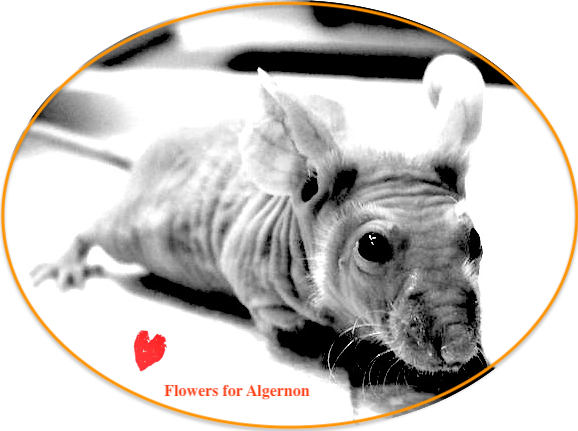On Reseach Ethics of Human being and Animals: A case study of Daniel
Keyes' "Flowers for Algernon,"
1966

On Reseach Ethics of Human being and Animals: A case study of Daniel
Keyes' "Flowers for Algernon,"
1966

『アルジャーノンに花束を』(1966)における、人間ならびに動 物に対する実験の研究倫理について考えるのがこのページの目的である。
小説のシノプシス(ウィキペディアより)番号は引用者が振った。
「(1)知的障害を持つ青年チャーリイは、賢くなって、周りの友達と同じになりたいと願っていた。他人を疑うことを知らず、周囲に笑顔をふりま き、誰にでも親切であろうとする、大きな体に小さな子供の心を持った優しい性格の青年だった。(2)彼は叔父の知り合いが営むパン屋で働く傍ら、知的障害 者専門の学習クラスに通っていた。ある日、クラスの担任である大学教授・アリスから、開発されたばかりの脳手術を受けるよう勧められる。先に動物実験で対 象となったハツカネズミの「アルジャーノン」は、驚くべき記憶・思考力を発揮し、チャーリイと難関の迷路実験で対決し、彼に勝ってしまう。彼は手術を受け ることを快諾し、この手術の人間に対する臨床試験の被験者第1号に選ばれた。(3)手術は成功し、チャーリイのIQは68から徐々に上昇し、数ヶ月で IQ185の知能を持つ天才となった。チャーリイは大学で学生に混じって勉強することを許され、知識を得る喜び・難しい問題を考える楽しみを満たしてい く。だが、頭が良くなるにつれ、これまで友達だと信じていた仕事仲間にだまされいじめられていたこと、自分の知能の低さが理由で母親に捨てられたことな ど、知りたくもない事実を理解するようになる。(4)また、高い知能に反してチャーリイの感情は幼いままだった。突然に急成長を果たした天才的な知能との バランスが取れず、妥協を知らないまま正義感を振り回し、自尊心が高まり、知らず知らず他人を見下すようになっていく。周囲の人間が離れていく中で、 チャーリイは手術前には抱いたことも無い孤独感を抱くのだった。さらに、忘れていた記憶の未整理な奔流もチャーリイを苦悩の日々へと追い込んでいく。 (5)ある日、自分より先に脳手術を受け、彼が世話をしていたアルジャーノンに異変が起こる。チャーリイは自分でアルジャーノンの異変について調査を始 め、手術は一時的に知能を発達させるものの、性格の発達がそれに追いつかず社会性が損なわれること、そしてピークに達した知能は、やがて失われ元よりも下 降してしまうという欠陥を突き止める。彼は失われ行く知能の中で、退行を引き止める手段を模索するが、知能の退行を止めることはできず、チャーリイは元の 知能の知的障害者に戻ってしまう。自身のゆく末と、知的障害者の立場を知ってしまったチャーリイは、自らの意思で障害者収容施設へと向かう。(6)彼は経 過報告日誌の最後に、正気を失ったまま寿命が尽きてしまったアルジャーノンの死を悼み、これを読むであろう大学教授に向けたメッセージ(「ついしん」)と して、「どうかついでがあったら、うらにわのアルジャーノンのおはかに花束をそなえてやってください」と締め括る」(ウィキ「アルジャーノンに花束を」)
| Synopsis of the
Novel, from Wiki, "Flowers for
Algernon" The novel opens with an epigraph taken from Book VII of Plato's The Republic: Anyone who has common sense will remember that the bewilderments of the eye are of two kinds, and arise from two causes, either from coming out of the light or from going into the light, which is true of the mind's eye, quite as much as of the bodily eye. Charlie Gordon, 32 years old, lives with phenylketonuria and demonstrates an IQ of 68. His uncle has arranged for him to hold a menial job at a bakery so that he will not have to live in a state institution. Desiring to improve himself, Charlie attends reading and writing classes at the Beekman College Center for Retarded Adults; his teacher is Miss Alice Kinnian. Two researchers at Beekman, Dr. Nemur and Dr. Strauss, are looking for a human test subject on whom to try a new surgical technique intended to increase intelligence. They have already performed the surgery on a mouse named Algernon, resulting in a dramatic improvement in his mental performance. Based on Alice's recommendation and his motivation to improve, Nemur and Strauss choose Charlie over smarter pupils to undergo the procedure. The operation is a success, and within the next three months Charlie's IQ reaches 185. However, as his intelligence, education, and understanding of the world increase, his relationships with people deteriorate. His co-workers at the bakery, who used to amuse themselves at his expense, now fear and resent his increased intelligence and persuade his boss to fire him. Later, Charlie confronts his scientific mentors about their condescending attitude toward him, particularly Dr. Nemur, because Charlie believed Dr. Nemur considered him a mere laboratory subject and not human before the operation. When not drinking at night, Charlie spends weeks continuing his mentors' research and writing reports which include observations of Algernon, whom he keeps at his apartment. Charlie's research discovers a flaw in the theory behind Nemur and Strauss's intelligence-enhancing procedure that could cause him to revert to his original mental state. His conclusions prove true when Algernon starts behaving erratically, loses his own enhanced intelligence, and dies. Charlie tries to mend the long-broken relationships with his parents, even as his own intelligence enhancements begin to slip away. He remembers as a boy his mother insisted on his institutionalization, overruling his father's wish to keep him in the household. His mother, who still lives in the family's old home in Brooklyn, has developed dementia and recognizes him only briefly; his father, who broke off contact with the family years earlier, does not recognize him at all. He is only able to reconnect with his now-friendly younger sister, Norma, who had hated him for his mental disability when they were growing up, and is now caring for their mother in their newly depressed neighborhood. When Norma asks Charlie to stay with his family, he refuses but promises to send her money. Despite regressing to his former self, he remembers he was once a genius. He cannot bear to have his friends and co-workers pity him. He decides to live at the state-sponsored Warren Home School, where nobody knows about the operation. In a final postscript to his writings, he requests that someone put some flowers on Algernon's grave in Charlie's former backyard. |
この小説は、プラトンの『共和国』第七巻から引用されたエピグラフで始
まる: 常識のある人なら誰でも、目の錯乱には二つの種類があり、光から外れるか光に入るかの二つの原因から生じることを覚えているだろう。 32歳のチャーリー・ゴードンはフェニルケトン尿症を患っており、IQは68である。叔父の計らいで、彼はパン屋で下働きをすることになった。自分を向上 させたいと願うチャーリーは、ビークマン・カレッジ・センター・フォー・リタデッド・アダルトの読み書きクラスに通う。ビークマンの二人の研究者、ネムー ル博士とストラウス博士は、知能を向上させることを目的とした新しい手術法を試す人間の被験者を探していた。彼らはすでにアルジャーノンというマウスに手 術を施し、その結果、彼の精神的パフォーマンスは劇的に向上した。アリスの推薦と彼の向上意欲に基づき、ネムールとストラウスは、より賢い生徒よりも チャーリーを選んで手術を受けさせることにした。 手術は成功し、その後3ヶ月でチャーリーのIQは185に達する。しかし、知性、教養、世界への理解が深まるにつれ、人間関係は悪化していく。パン屋の同 僚たちは、以前は彼の出費を面白がっていたが、今では彼の知能の上昇を恐れ、憤慨し、上司に彼を解雇するよう説得する。その後、チャーリーは科学者たちの 恩師たち、特にネムール博士に、自分を見下している態度を突きつける。ネムール博士が、手術前の自分を単なる実験台であり、人間ではないと考えていたから だ。 夜中に酒を飲まないとき、チャーリーは何週間も師匠たちの研究を続け、自分のアパートで飼っているアルジャーノンの観察を含む報告書を書く。チャーリーの 研究は、ネムールとストラウスの知能強化手術の理論に、アルジャーノンが元の精神状態に戻ってしまう可能性のある欠陥を発見する。彼の結論は、アルジャー ノンが不規則な行動をとり始め、彼自身の強化された知性を失い、死亡したときに真実であることが証明される。 チャーリーは、自身の知能強化が失われ始めても、長い間壊れていた両親との関係を修復しようとする。チャーリーは少年時代、母親が彼を施設に入れたいと主 張し、家庭内に留めておきたいという父親の願いを押し切ったことを覚えている。ブルックリンの旧家に住む母親は認知症になり、彼のことをほんの少ししか認 識していない。チャーリーが再会できるのは、幼い頃、知的障害のためにチャーリーを嫌っていた、今は優しい妹のノーマだけである。ノーマはチャーリーに家 族と一緒にいてほしいと頼むが、チャーリーは断る。 元の自分に戻ったにもかかわらず、彼はかつて自分が天才だったことを思い出す。友人や同僚に同情されるのが耐えられない。彼は、誰も手術のことを知らない 国営ウォーレン・ホーム・スクールで暮らすことを決意する。チャーリーの裏庭にあるアルジャーノンの墓に花を供えるよう、誰かに頼む。 |
映画
リンク
文献
その他
Copyleft, CC, Mitzub'ixi Quq Chi'j, 1996-2099
Do not paste, but
[Re]Think our message for all undergraduate
students!!!
++
Copyleft, CC, Mitzub'ixi Quq Chi'j, 1996-2099
☆
 ☆
☆